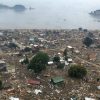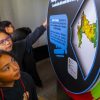In order to take advantages of the abilities present in the three largest Universities in the country, collaboration has been the key, and thus highlighting the role of Chilean science in making decisions.
Por Comunicaciones VRID / lucabrer@udec.cl
In August 2021, the ICOVID initiative completed one year of operation. An unprecedented project that has made it possible to follow the figures that arise from the COVID-19 epidemic in our country, through weekly analysis carried out by researchers from Chilean universities.
The platform also seeks to make available, to the community, the greatest amount of information about the situation of the disease in the country. The observation of indicators is based on four dimensions: the dynamics of disease contagion, testing figures, traceability and isolation, also data that comes from the Health sector, such as hospital capacity translated into bed availability and ventilators.
ICOVID was born from the collaboration agreement between the Ministry of Health and the Universidad de Chile and the Pontificie Universidad de Chile. The Universidad de Concepción followed soon after. Together with them, the Ministry of Science, Technology, Knowledge and Innovation collaborated; playing an articulating role and also a role of disseminating the results towards public opinion and scientific community.
The UdeC rector, Doctor Carlos Saavedra Rubilar, emphasized that one of the fundamental pillars to face the pandemic caused by Covid-19 has been the collaboration capacity between the scientific world and government entities, especially in search of solutions and the construction of information for the decision making. “ICOVID Chile is precisely one of the best examples of interdisciplinary and inter-institutional collaboration for the generation of relevant information for citizens, content based on the periodically data delivered by the MINSAL. This initiative, which has completed one year of work, has been very useful for citizens and authorities who can follow the evolution of the pandemic in our country week by week. We appreciate the extensive effort that the researchers, who participate in ICOVID Chile, have developed, as well as their important contribution to our population health”, he indicated.
On her part, Doctor Andrea Rodríguez Tastets, vice-rector for Research and Development at UdeC, referred to the work of epidemiology experts, public health, mathematics, statistics, biostatistics, ecology, economics, engineering, computing and communications. “ICOVID reflects the spirit of collaboration of universities before a problem that affects the country and the world globally. It has been an experience (at disposal of the) that works with the capacities of academics from different disciplines and from these three great institutions”, she highlighted.
DATA TO DECISION-MAKING PROCESS
As Doctor Rodríguez explains, in the first stage, the ICOVID team defined the indicators that would be followed during the pandemic, in order to observe its evolution. This way, the information collected has been delivered to the Government and the media, an effort that has been appreciated by the authorities. “ICOVID represents an example of how the State and the Academy can work together to generate scientific evidence that is relevant in decision-making,” said the head of the Department of Epidemiology of the Ministry of Health, Alejandra Pizarro Ibáñez.
The procurator noted that “ICOVID has played a very important role in giving citizens confidence in the management of data associated with the pandemic, since these are analyzed by independent researchers, in order to account for the situation of the pandemic in our country”. The reports indeed offer a territorial view, which facilitates to identify the situation of each region. “Likewise, it has allowed the installation of capacities within the Minsal, regarding complex analysis and data management, which will be a contribution to future projects, as well as for other countries,” Pizarro claimed.
The experience accumulated, after more than 54 reports, made it possible to prepare a synthesis during August, pointing out some milestones that marked the course of the pandemic. Thus, this document facilitates the analysis of the vaccination influence, the way in which the health system responded at different stages and how the population was affected according to age groups. “It has been an enriching experience for those of us who participated, getting to know and building trust among a team which has been able to exchange knowledge around a country need,” concluded Dr. Rodríguez. ICOVID’s periodic reports can be consulted on its website.
Last modified: 29 de agosto de 2025






